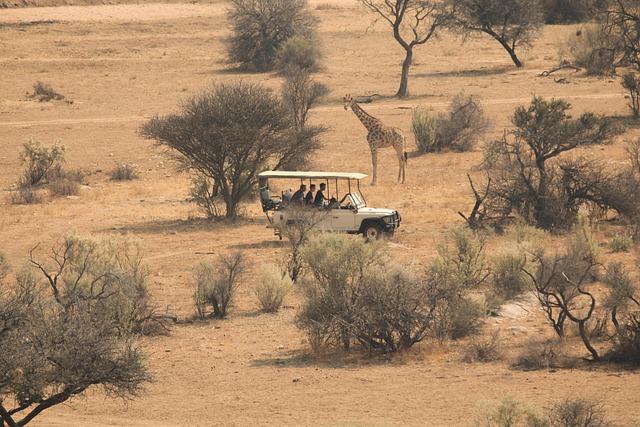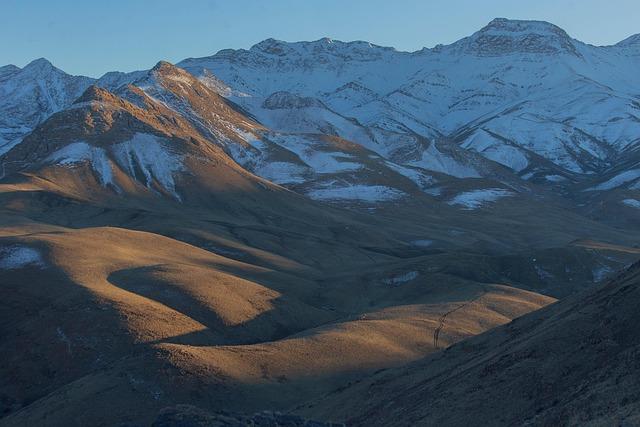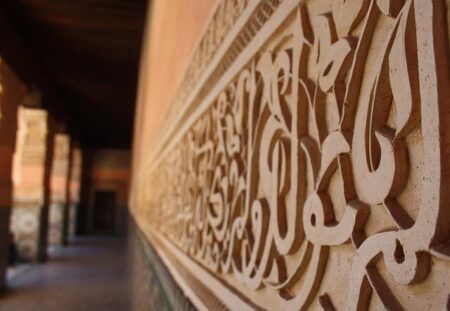In a bold reaffirmation of its international alliances,the African National Congress (ANC) of South africa has expressed a commitment to strengthening its ties with Iran,a nation often regarded with suspicion in international relations. This declaration, framed within the ANC’s broader foreign policy strategy, underscores the party’s perspective that diplomatic friendships should not be concealed or forsaken, even amid global tensions.The ANC’s stance highlights the complexities of geopolitics in the contemporary world, where ideological alignments often clash with the prevailing narratives of democracy and human rights espoused by Western nations. As the Foundation for Defense of Democracies analyzes this unexpected embrace,the implications of such a partnership reverberate through discussions surrounding regional stability,economic interests,and South Africa’s role on the global stage.
Embracing Geopolitical Alliances: ANC’s Stance on Iran
The African National Congress (ANC) has firmly positioned itself as a staunch ally of Iran in the complex landscape of international relations. This commitment is evident as ANC officials emphasize a philosophy rooted in mutual respect and solidarity, encapsulating the sentiment that nations cannot subvert their friendships merely due to external pressures. The party’s leadership insists that their diplomatic outreach acknowledges not only historical ties but also shared interests that transcend cultural and ideological differences. Key themes shaping this stance include:
- Historical Solidarity: The ANC recalls Iran’s support during its struggle against apartheid, underpinning their friendship with a historical narrative.
- Economic Collaboration: There is a focus on potential economic partnerships, especially in energy and technology sectors.
- Geopolitical Strategy: Aligning with Iran positions South Africa in a distinct block within the Global South, emphasizing anti-imperialist sentiment.
However, this alliance has raised eyebrows among opponents who argue that aligning with Iran risks straining South Africa’s relationships with Western powers. Critics contend that such a stance could lead to economic repercussions, particularly in sectors tied to international trade and immigration. In light of these challenges, the ANC must navigate a delicate balance, considering both the benefits of partnership and the potential diplomatic fallout. As the geopolitical landscape evolves, the ANC’s strategic choice to embrace Iran may redefine its approach to foreign relations, possibly leading to impactful shifts in South Africa’s international role.

The Historical Context of South Africa-Iran Relations
The relationship between South africa and Iran has evolved through significant historical milestones influenced by political, economic, and social dynamics. During the apartheid era, South Africa faced international isolation, prompting the African national Congress (ANC) to forge alliances with nations that opposed Western hegemony, including Iran.This bond intensified following the 1979 iranian Revolution when both nations found common ground in their struggles against imperialism.Despite differing ideologies, the ANC’s support for the Palestinian cause and its alignment with Iran’s anti-Western sentiment created a shared platform that nurtured bilateral relations, which have continued to develop even after South Africa’s transition to democracy in the early 1990s.
In contemporary times, the expanding partnership between the ANC goverment and Iran aligns with broader geopolitical shifts. South Africa’s support for iran’s right to nuclear technology, in the context of resistance to Western pressures, has drawn both domestic and international scrutiny. Adopting a stance characterized by slogans like “We Can’t Hide Our Friends,” the South African government emphasizes its commitment to fostering solidarity with nations framed as opposition to Western narratives. This is particularly relevant in:
- Economic Cooperation: Trade agreements and shared investments.
- Cultural Exchanges: Increased diplomatic and cultural outreach.
- Strategic Alliances: Joint positions on global forums addressing human rights and advancement.

Economic Implications of Strengthening Ties with Iran
Strengthening ties with Iran presents several economic implications for South Africa, particularly under the governance of the ANC. As diplomatic relations deepen, South Africa may witness a surge in trade opportunities, particularly in sectors where Iran has substantial capabilities, such as oil and gas, engineering, and agricultural products. This pivot towards Iran could facilitate more normalized trade routes and enhance energy security, providing South Africa with access to competitively priced resources.Potential benefits include:
- Increased Import Diversification: Reducing dependence on customary partners.
- Investment Opportunities: Attracting Iranian investments into critical infrastructure projects.
- Joint Ventures: Collaborating on agricultural advancements and technological exchange.
Moreover,the economic ties with Iran could lead to south Africa navigating a complex geopolitical landscape,particularly with Western nations observing closely. The investment climate,liquidity in the market,and foreign exchange dynamics may be impacted by sanctions on Iran,affecting South Africa’s banking and financial sectors. Understanding these challenges is vital, as they could manifest in several key areas:
| Potential Challenges | Implications for South Africa |
|---|---|
| Sanctions Risk | Increased scrutiny on trade agreements and financial transactions. |
| Market Volatility | Fluctuations in energy prices could destabilize the economy. |
| Political backlash | Increased tensions with Western allies and potential diplomatic isolation. |

Global Reactions and Diplomatic Ramifications for South Africa
The recent strengthening of ties between South Africa and Iran has elicited a spectrum of responses from the international community, with significant diplomatic ramifications for Pretoria.Critics, particularly from Western nations, view this burgeoning relationship as a troubling indication of South Africa’s shifting allegiance amidst ongoing geopolitical tensions. Many analysts warn that engaging closely with Iran, a nation under heavy sanctions and viewed as a state sponsor of terrorism by several countries, could lead to a deterioration of South Africa’s diplomatic relations with key allies, especially in Europe and North America. Suggestions of potential sanctions or trade repercussions have begun to surface, highlighting the precarious balance Pretoria must maintain in the global arena.
Moreover,the implications for regional stability cannot be understated. This alliance may embolden Iran’s influence in Africa, potentially igniting concerns among neighboring countries wary of Tehran’s expansionist policies. Following the announcement of enhanced cooperation, there are fears that it could lead to a realignment of power dynamics within the continent. In response, several African states could reconsider their diplomatic approaches to both Iran and South Africa. Key elements of this evolving diplomatic landscape include:
- Heightened Tensions: Increased scrutiny from the United States and EU regarding South Africa’s foreign policy.
- Regional Alliances: Possible reconfiguration of alliances among African nations considering South Africa’s decisions.
- Trade benefits vs. Diplomatic Costs: Balancing potential economic gains from Iran against the risk of alienation from traditional partners.

Recommendations for Navigating Complex Partnerships
Navigating complex partnerships requires a multifaceted approach that emphasizes openness and mutual respect. Engaging with countries like Iran, as recently highlighted by the ANC in South Africa, necessitates a careful examination of the underlying geopolitical dynamics.Building frameworks for collaboration can definitely help establish common goals, ensuring that both parties are aligned in their interests.Consider the following strategies when entering such partnerships:
- Open Dialogue: Foster an environment where all stakeholders can express their concerns and aspirations.
- Risk Assessment: Thoroughly evaluate potential risks associated with the partnership and prepare contingency plans.
- Cultural understanding: Prioritize learning about the partner’s cultural and political background to enhance collaboration.
- Continuous Engagement: Maintain regular interaction and touchpoints to monitor performance and address challenges.
its crucial to be strategic about the alliances forged in today’s global landscape. For instance,practicing due diligence before committing to partnerships is key. Organizations can benefit from maintaining a balanced portfolio of international relationships to mitigate backlash and strengthen their diplomatic standing. Below is a simple table outlining factors to consider when evaluating potential partners:
| Factor | considerations |
|---|---|
| Political Stability | Assess the government’s reliability and its impact on foreign relations. |
| Economic Conditions | Evaluate economic indicators and investment climate. |
| Human Rights Record | Consider how a partner’s policies align with international human rights standards. |
| strategic Interests | Identify overlapping goals to foster a synergistic partnership. |

Future Outlook
the recent remarks by South Africa’s African National Congress (ANC) highlighting their intention to embrace Iran mark a significant moment in the nation’s foreign policy landscape. As the ANC emphasizes its commitment to friendship and solidarity with nations it perceives as aligned in purpose, the implications of this stance resonate far beyond South Africa’s borders. This decision not only reflects the ANC’s historical alliances but also raises questions about the complexities of global diplomacy and the balancing act between national interests and international partnerships. As South Africa navigates its international relations in an increasingly polarized world, the spotlight will remain on how these affiliations with controversial regimes like Iran will shape its political and economic future. Observers and policymakers alike will watch closely as the ANC seeks to define its role on the global stage, highlighting the delicate interplay between ideology, allegiance, and pragmatism in contemporary geopolitics.







